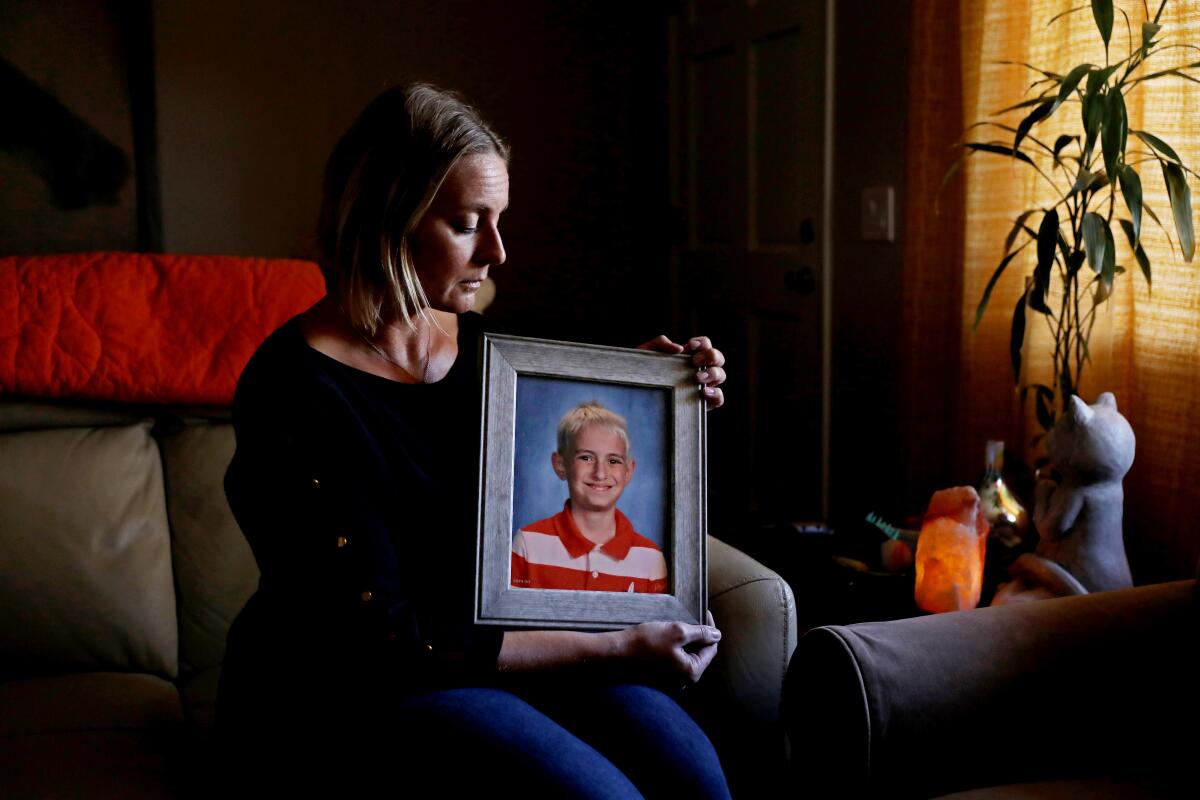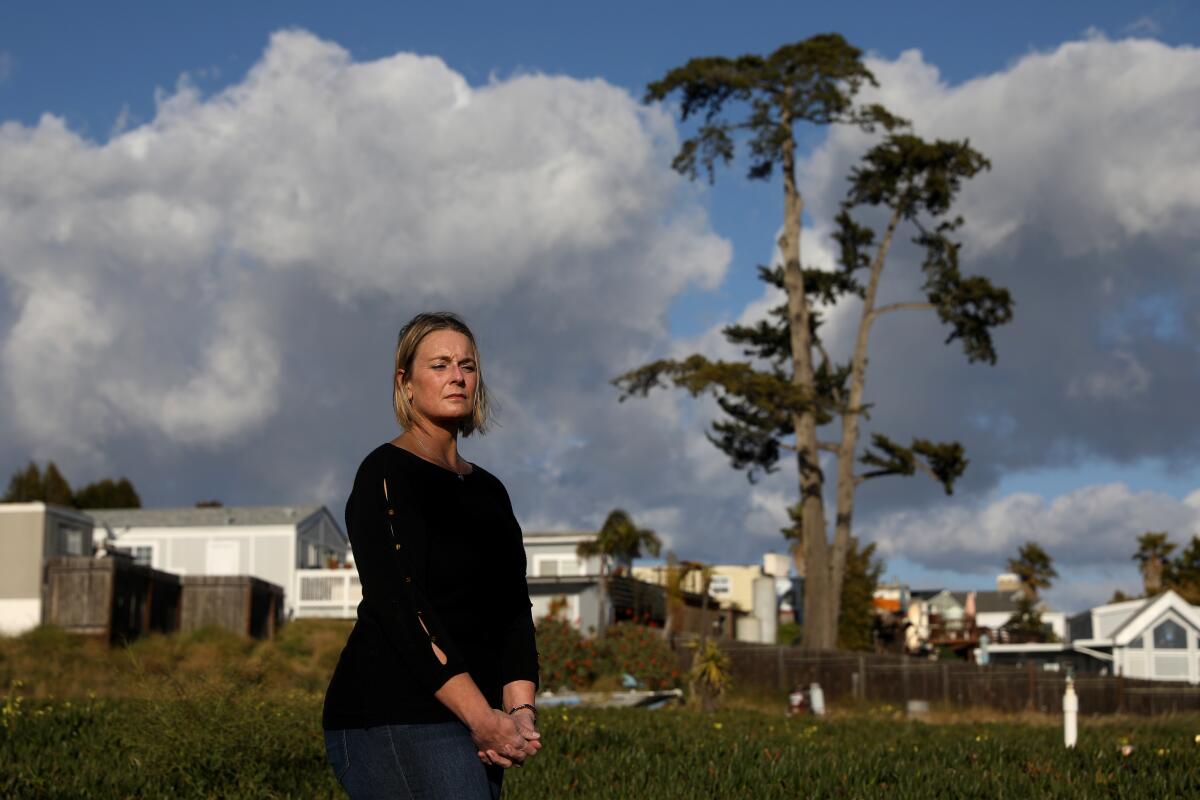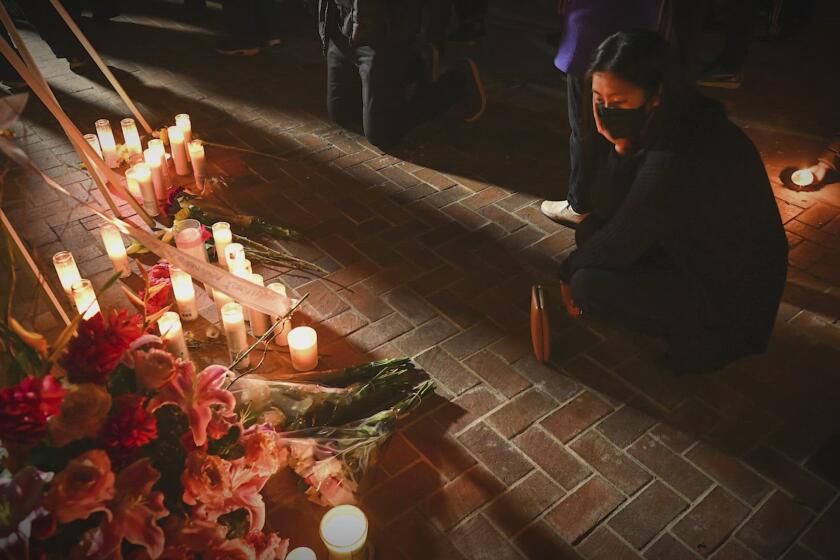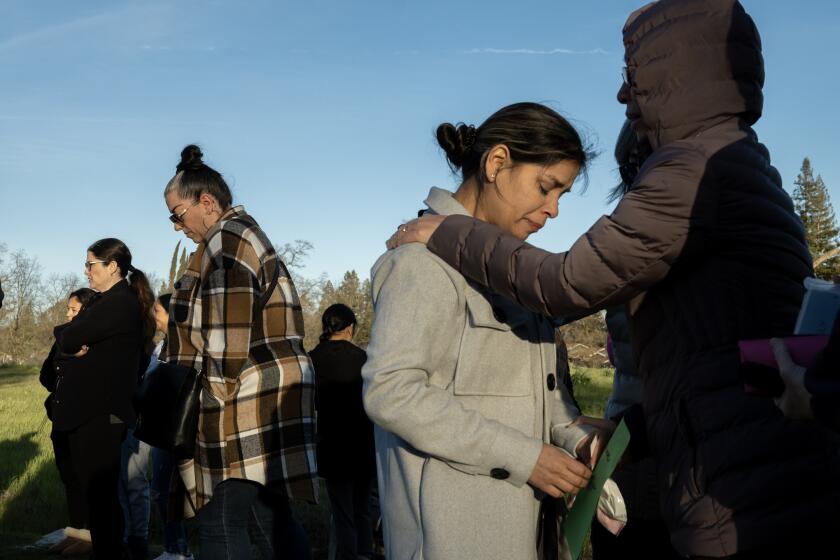He threatened to kill his son. He was still able to purchase a gun. Now, a bereaved mother asks how

- Share via
HANFORD, Calif. — On a chilly Monday morning in March 2020, Christy Camara drove to pick up her 10-year-old son for school.
Wyland — a quiet boy with big brown eyes and a wry sense of humor beyond his years — was staying at his grandparents’ house, where his father lived after the divorce.
As Camara neared, police officers blocked her. Yellow crime scene tape surrounded the stucco house.
In this small Central Valley city — where Camara and her ex-husband went to the same elementary school their son attended — the faces were familiar: The fireman Camara went to high school with. The officer who was friends with her father.
No one would look her in the eye.
Her ex-husband, Victor Gomes, had shot Wyland in the head before killing himself.
He used a Glock pistol he bought from a nearby gun store when he was supposed to have been under a restraining order that prohibited him from buying a firearm.
As she struggled with paralyzing grief, Camara fixated on one question: How could Gomes have bought the gun?
She sent a flurry of records requests: to the Hanford Police Department, the Kings County sheriff, district attorney and superior court, the California Department of Justice.
What she found was a byzantine system of confidential databases and inconsistent data entry processes that left her with few answers as to why the restraining order was not enforced.
Camara is now suing the California Department of Justice, which has denied her requests for details about the gun sale and the background check.
“Why are they still protecting him?” she said of her ex-husband last month, on the third anniversary of her son’s death.
California has the strictest gun laws in the country. But somewhere, Camara believes, the system broke down.
She does not know if court orders barring her ex-husband from having a gun were ever entered into state law enforcement databases that would have flagged him as a prohibited buyer.
The show, airing on ‘L.A. Times Today’ on Spectrum News 1, explores the repercussions of the Jan. 21 shooting in Monterey Park and the ways members of the public have responded to the epidemic of gun violence in California.
The gun store had run a required background check through the California Department of Justice, which came back clean, according to the store owner.
Camara said she feels as if the state cares more about the privacy of a dead man than her right to know how he bought the gun that killed her son.
She wants to see a law named after her only child — a Wyland’s Law — that will save other kids, if she can just figure out what went wrong.
::
The threats were well documented.
On a Saturday morning in October 2016, Camara got a frantic call from a family friend: Go get Wyland from his dad’s house. Now.
Is he going to hurt wyland or I? Camara asked in a text message just after the call, according to a screenshot of the conversation in court records.
Not you, the friend responded.
Him and wyland?
Just get him out please. And call me, the friend wrote.
Gomes had just received the final divorce papers in the mail. He had called the friend and said he wanted to kill himself and Wyland while leaving Camara alive so she would “live with the hurt” the rest of her life, Camara wrote in a request for a restraining order.
He had called another friend the night before and said the same thing.
When Camara got to Gomes’ house, she saw two gun magazines, filled with bullets, under the coffee table. She said they struggled over the boy and that Gomes pulled the screaming child from her arms. But she was able to leave with Wyland.
Camara rushed to the Hanford police station and reported that Gomes was making threats, had bipolar disorder and depression and had attempted suicide in the past.
A police officer visited Gomes at home.
“He stated he has been taking all of his medications and feels completely fine,” the officer wrote in an incident report. “He informed me the reason he bought a gun recently was because Christy never liked guns and now that he was divorced from her he wanted one.”
“After talking to Victor I did not think he was going to hurt himself or others.”

Three days later, on Oct. 25, 2016, a Kings County judge signed a temporary restraining order that barred Gomes from possessing or buying a gun. It was set to expire at the end of a hearing scheduled the next month.
It was a CLETS order, meaning it should have been entered into the California Law Enforcement Telecommunications System, the computer network managed by the state Justice Department that connects public safety agencies to criminal histories, driving records and other databases.
When a gun store runs a background check, any CLETS order against a buyer should show up.
Gomes turned his gun over to Hanford police.
“I did so because I wanted there to be no issues preventing me from my visitation with Wyland,” Gomes wrote in a court declaration.
::
Wyland was a baseball player — a little guy, thinner and shorter than his teammates, who insisted on using a blue hand-me-down bat that was much too big for him.
He loved reading Harry Potter books, playing video games and eating the kids’ steak dinner at Sizzler. His favorite colors were blue and orange.
“He was funny and quiet,” Camara said.
“He was really full of life when he was younger,” she added. But as he got older, “his dad deterred him from wanting to be part of anything.”
As the divorce dragged on, Wyland stopped wanting to see his friends. He didn’t want to go to birthday parties.

His dad would pull him out of school “for no particular reason but to take him home,” Camara wrote in court papers.
Gomes, she said, talked to the child as though he was an adult, convincing him that he was his only friend.
For the first few weeks, the temporary restraining order took away Gomes’ visitation rights.
I hate that things have to be this way but unfortunately ... Vic brought on all of the worry himself so we have to take measures to ensure Wyland’s safety, Camara texted her friend.
::
In December 2016, after a delay, a hearing on whether to extend the temporary restraining order took place in Kings County Superior Court.
Camara’s and Gomes’ attorneys had reached a multi-pronged agreement.
Gomes would be able to resume supervised visits with Wyland. He would schedule a mental health evaluation with a licensed psychologist or psychiatrist within 30 days of the hearing. If he got a good report, he could start unsupervised visits.
If, after two months, those visits were going well, the parties could consider lifting the CLETS order.
The judge, Kings County Superior Court Commissioner Jerry F. DeMelo Jr., ruled that the temporary restraining order — and its firearms prohibitions — would remain in place for nine months, until September 2017, unless all the parties agreed to remove it sooner.
DeMelo asked Camara’s attorney to fill out a restraining-order-after-hearing form, which is the formal written order — signed by the judge — that summarizes the ruling made from the bench.
“I’m obviously comforted by the fact that you have taken charge,” DeMelo told the attorneys, according to a transcript of the hearing. “Because I’ll tell you, these are the kinds of cases that are difficult for me.”
Camara left the courtroom believing that DeMelo’s ruling, detailed in a minute order entered into the court file, was in full effect until September 2017.
::
On May 18, 2017, Gomes bought a Glock 17 semiautomatic pistol from Kings Gun Center, a state-licensed gun dealer in Hanford.
Todd Cotta, the store’s owner, said recently that handgun buyers must provide photo identification and proof of residency. The store then submits the buyer’s information digitally to the California Department of Justice, which performs the background check.
David Mora shot and killed his three daughters and a chaperone during a supervised visit last year. The children’s mother warned the courts he was dangerous, but no one listened.
The buyer must wait 10 days to pick up the gun, even though the background check “takes seconds,” Cotta said.
A domestic violence restraining order is flagged “if the court system put it in,” he said.
For Gomes’ purchase, “everything was done per state and federal law,” Cotta said. “He was approved by the California Department of Justice.”
Cotta said he has records documenting the sale but that it was so standard that he does not remember it, or Gomes. He said he “doesn’t follow the news” and was not aware of the murder-suicide when it happened.
::
Camara’s former attorney, John Umscheid, did not file the restraining-order-after-hearing until August 2017, eight months after the judge requested it.

In an email, Umscheid declined to say why he took so long to file the document.
It is unclear whether the filing needed to occur before the information about Gomes was entered into CLETS and other law enforcement databases.
Camara does not know if the databases ever contained the restraining orders and gun prohibitions.
The latest restraining order was set to expire on Sept. 9, as the judge had ordered.
Julia Weber, an attorney and consultant for Giffords Law Center to Prevent Gun Violence who is familiar with Camara’s case, said Gomes was prohibited from buying a gun as soon as the judge said so in court.
Though there are often delays before the filing of final paperwork, a judge’s oral order “is, in fact, an order,” Weber said.
Ideally, an order should be entered into state law enforcement databases within one business day, said Weber, a former supervising attorney for the California Judicial Council who trained judges and court staff.
Some county courts enter restraining orders into the CLETS database themselves, while others rely on law enforcement agencies.
Thanks to the Supreme Court, cases challenging California’s gun laws have been focused more on distant history than the weapons’ modern threat.
In Kings County, court officials do not have direct access to CLETS, said Nocona Soboleski, the court’s executive officer. Law enforcement officials, typically with the Sheriff’s Department, enter the orders, Soboleski said.
Nationwide, there is a great deal of inconsistency in how, when and by whom restraining orders are entered into databases, said Daniel Webster, director of the Johns Hopkins Center for Gun Violence Prevention and Policy.
Too often, he said, that variability leads to data entry errors and to delays that allow prohibited people to buy guns.
“Timeliness matters for restraining orders. ... Courts promptly getting that information entered is important to prevent tragedies,” Webster said.
The data systems themselves can be vulnerable to error too, Webster said. Many, he said, are outdated and handle a much greater volume of gun purchases than when they were created.
::
In the summers, Camara, a manicurist, encouraged her increasingly serious little boy to do something wild with his hair and “have fun being a kid.”
In the summer of 2019, she took him to a salon to get his hair dyed bright blue.
He entered fifth grade with bleach-blond hair, courtesy of the color remover. On the first day of school, his friends called him Slim Shady because he looked like the rapper Eminem.
He wears that hairdo — and a big grin — in his final school portrait.
::
The gun that Gomes turned in to authorities after the initial restraining order in October 2016 was still in police custody after the murder-suicide, said Hanford Police Capt. Karl Anderson.
Camara had not known that he bought a second gun.
Only after she filed a records request with the city of Hanford in 2021 did she learn that he purchased the murder weapon while the restraining order was supposed to be in effect.
“It was shocking to get confirmation he bought the gun during that time,” Camara said.
“It’s not like he bought it on the black market,” added her attorney, Joseph M. Alioto Jr., a former federal prosecutor. “He went out and bought it at a California licensed gun dealer.”
Camara filed a request with the California Department of Justice for records showing whether, and when, Gomes was listed as a prohibited firearms possessor in any state-accessible databases; records showing when, and by whom, a background check was conducted before he got the gun; and other records detailing the purchase.

She sued the department in October after it denied almost all of her requests.
In a statement to The Times, the department said that records about individual firearms background checks and gun purchases — as well as information from the state’s database used to track individual restraining orders — cannot be disclosed under the state’s public records law.
“First, our hearts go out to the family grieving this tragic loss,” read the statement, which said the department has been “actively working” to see if there is any information it can legally provide to help Camara.
In a 2021 court filing in response to Camara’s lawsuit, Department of Justice attorneys said some of the records can be shared only with prosecutors, police officers and other law enforcement officials, while disclosure of other records “would constitute an invasion of personal privacy.”
Alioto said the Justice Department will not specify whose privacy it is referring to — but that he believes it is Gomes’.
“The Department of Justice’s position that Victor Gomes’ rights outweigh the interests of Californians is contrary to the law. It is also contrary to reason,” Alioto said.
“It’s clear in this case that a mistake has been made that led to the murder of a 10-year-old boy,” he added. “Californians have a right to explore why that happened and to hold their government accountable to make sure it never happens again.”
Attempts by The Times to reach Gomes’ parents were unsuccessful.
The Department of Justice says its online portal exposed the personal information of anybody who was granted or denied a concealed-carry permit from 2011 to 2021.
The California Department of Justice has touted its gun data transparency. Last summer, it launched a website that was supposed to display anonymous statistical information on firearms, including the issuance of concealed carry weapons permits and gun violence restraining orders.
It accidentally published personal information — including names, birthdays and addresses — of about 192,000 concealed carry permit holders and applicants online.
The mistake was blamed, in part, on officials who did not understand how to operate their own website, according to an independent law firm’s investigation of the data leak.
::
Camara left Hanford for a condo in San Luis Obispo County where peace signs and photos of her boy cover the walls.
On the refrigerator is a handwritten Mother’s Day note from a 6-year-old Wyland: I think my mom is special for many reasons. First, because she is my mom. Next, also because she gives me kissis.
Camara realizes she may never know exactly how her ex-husband got the gun.
She has channeled her grief and rage into the lawsuit and writing a book about life after such an earth-shaking tragedy.
She shares her son’s dry sense of humor. She would rather think about how much he made her laugh than how he died.
The title of her book is, “Can I Still Be Funny After My Son’s Murder?”
The answer, she hopes, is yes.
More to Read
Sign up for Essential California
The most important California stories and recommendations in your inbox every morning.
You may occasionally receive promotional content from the Los Angeles Times.















